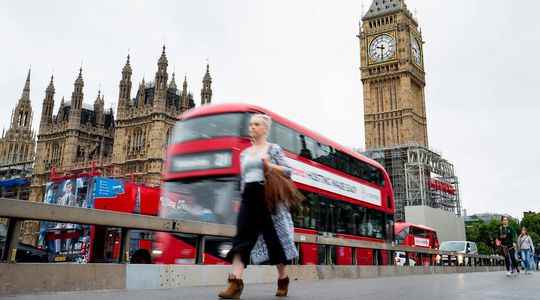The series of scandals affecting Boris Johnson hastened his downfall. The British Prime Minister indicated this Thursday, July 7 that he was going to present his resignation as head of the Conservative Party and will leave Downing Street. Inflation at its highest in 40 years in the country, at 9.1% in May 2022 over twelve months, has also seriously damaged the popularity of the British Conservative government, accused of inaction by the opposition.
Soaring food prices and energy, worsened since the start of the Russian invasion of Ukraine, is expected to worsen further in October when the cap on energy prices will be raised sharply in the United Kingdom. Ana Boata, director of economic research at Allianz Trade, explains why inflation is so high in the country.
L’Express: The price increases are widespread and affect several sectors, mainly food and energy. In a context where all countries are affected by inflation, particularly due to the war in Ukraine, what are the specificities encountered by the United Kingdom?
Ana Boata: The United Kingdom differs from its neighbors with a particular system which consists of revising prices in the energy sector every six months and listing price variations – currently on the rise – directly with the consumer. In other words, the delays in transmission of variations are much greater in the United Kingdom than elsewhere and the country has very high energy inflation. As of April 1, the electricity and gas bills of 22 million Britons have risen by an average of 54%. At the next price revision, next October, we can expect a 40% increase. In the United Kingdom, as in Eastern Europe, if inflation is higher it is because energy expenditure represents a greater share for households.
Added to this is another specificity, linked to Brexit: the withdrawal of the British from the EU has accentuated labor shortages, shortages which have however led to high wage increases, of the order of 6 % in 2021 and this year by 5%. Brexit maintains a lot of uncertainty about the country’s economic situation, and to this we can now add political uncertainty with the departure of Boris Johnson.
We can also mention another factor: the currency. There was a very strong transmission effect from the depreciation of the currency, the pound sterling, to inflation insofar as the share of imports in finished goods is very high. So there is not at all this effect of competitiveness of the currency that we can have elsewhere. The British economy finds itself at the crossroads between very weak growth (0.1% in the 3rd quarter) and a recession (-0.4% in the 4th quarter).
What measures have the British government taken to try to restore purchasing power to households?
In compensation for the price revision every six months, the British government distributes an inflation check twice a year and devotes 1.5 points of GDP to household purchasing power thanks to this direct aid. Last April, all households received a check and will receive a second one next October. But, as everywhere, the government’s room for maneuver is limited because the public deficit shows -6.5% of GDP.
Tax increases, particularly on corporations, were planned for next year. However, when taxes are increased, inflation increases. As Boris Johnson resigns as leader of the Conservative Party and leaves Downing Street, will these increases be delayed, in a context where the general election in 2024 is approaching and where growth is very weak? We will see it.
Is the end of these fevered price increases in sight?
In a scenario where the conflict in Ukraine is not advancing and where Russia still manages to sell its oil and therefore there is no supply problem, it is possible that price increases in the energy sector will be slowed down or even that we are witnessing the end of these consecutive increases . In a global recession scenario, oil prices could fall by at least 30%. It should be remembered that in the United Kingdom, electricity distributors are very vulnerable financially and they therefore cannot fail to pass on these increases.
We can expect the peak of the rise in inflation to come at the end of this year 2022. We can expect inflation to average 3.5% next year. I don’t see inflation going below 3% structurally because of Brexit. In this case, inflation could be tolerated and therefore would not be such bad news in an environment of excessive debt in both the private and public sectors.
A first day of strong mobilization took place on June 21 during the largest strike movement in thirty years in the rail sector in the United Kingdom. What are the other sectors of activity where discontent is simmering?
These are mainly sectors where labor shortages are strong: transport, construction, health and to a lesser extent food, both distribution and catering. If there are labor shortages, the bargaining power of wages in these sectors is in theory higher and can therefore lead to social mobilizations.
Why is the UK more affected than other countries by these labor shortages?
These shortages are caused by both Covid-19 and Brexit. The pandemic has created some changes in society, such as moves within the country and the departure of many foreign workers from the country. The cycle of shortages had begun in 2019 due to demographic factors, so the Covid and Brexit only accelerated them. These labor shortages are likely to continue in the future unless the government reinvigorates immigration.
It should be remembered that inflation is caused both by labor shortages and by problems encountered in transport. In this sector there are additional administrative constraints: delays are very long and costs high. It can also be noted that the government is not in the process of reducing administrative constraints: customs checks on imports were, for example, put in place this year.
